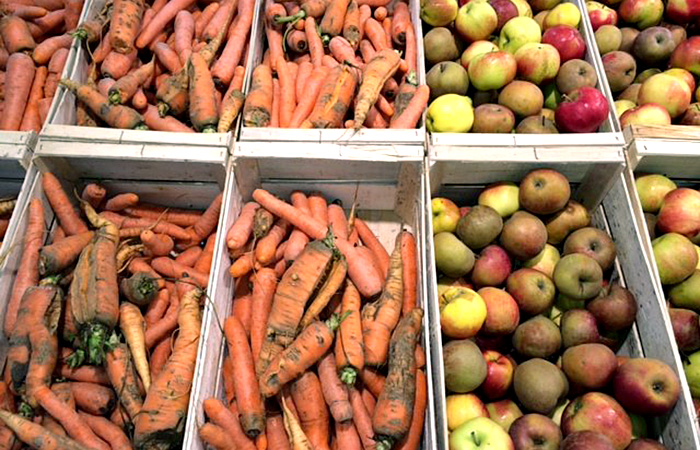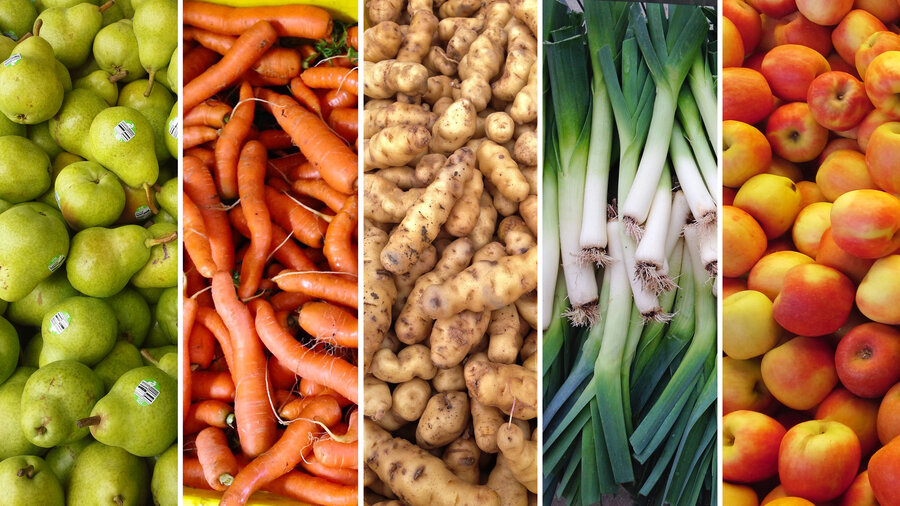FOOD COSMETICS
I really like the recent
movement of the "Gueules Cassées" (Broken Faces) in France. This
movement promotes the sale and consumption of ugly products, ie products that
have been declassified and destined for trash. It is an allusion to the French
soldiers disfigured by the First World War.
I am very receptive to this
problem, and if you read from me long enough, you have seen my posts 18, 19, 21
and 23 of the months of May and June on these problems. If you follow me on
Facebook, Twitter or LinkedIn, you have also seen several re-publications on
this topic. The movement begins to be copied in several countries.
I want to speak again about
this subject, following an Argentine article (in Spanish), I published my
different accounts, in which a scientist, Daniel Igarzábal, Director of the
Research, Development and Experimentation Regional Laboratory (Córdoba,
Argentina) said at a conference, that agriculture must change direction, and
stop seeing insects as enemies while promoting biodiversity, to live with them.
On the substance, I agree
with him, but the reality of today's agriculture is not exactly the one he's
dreaming. Agriculture cannot change alone. It is society that needs to change,
and agriculture with it.
To understand the farmer
issues, one must be placed, not in the position of the research scientist and observer
of nature and its workings, what Daniel Igarzábal is, but in the one of the
economic actor integrated in the society and who must comply with its
requirements, what the farmer is.
We have to move towards
what he says, that's pretty sure, but for that we need to change certain
postulates of our modern civilization.
On fruits and vegetables,
and all agricultural products not intended for processing, nearly 50% of
treatments made with pesticides, organic or conventional, have a cosmetic
purpose. It means they are applied to solve a problem, insect or disease, whose
only consequences are aesthetic, on the product that will be proposed to the
consumer.
Is this reasonable? Is this
compatible with sustainable and environmentally friendly agriculture?
Of course not, but to solve
this real problem of our society, the movement of Les Gueules Cassées will not
be enough and more, is not really going in the right direction.
Its goal,
while laudable, is to reduce the scandalous food wastage in our society. It
seeks and obtains an awareness of the entire civil society, about a problem
that is getting worse. That's good, but it will not solve the farmer's problem.
Let's go
back for a moment on the issue. The farmer is a person who cultivates the land
to raise plants and animals in order to make a living by producing food. He
lives with the seasons, rises early, has tractors and rubber boots, and rarely suffers
traffic jams.
But do not
forget the most important.
The farmer
must face problems very "down to earth", far from
philososophico-philanthropic concerns about feeding humanity in the respect of
Mother Nature. He manages a business, more or less large, he must ensure its
sustainability by securing the earnings to make it work, while deriving a
decent income.
It lacks
poetry and romance, no doubt, but the administrations of taxes or Social
Security are insensitive to it.
To be clear,
a farmer, whatever the scale on which he works, is first an entrepreneur, and
as such, it must manage all the problems inherent in this activity.
His first
problem: providing his customers with products in conformity to a number of
specifications. Depending on quality, the products will be categorized, and
paid accordingly. The higher the quality, the higher the income of the farmer
will be good, for the same amount provided.
From this
premise, what means the word quality? this is where the problem lies. Every
level of the food marketing network has its own definition of quality, and this
is another real society problem.
For the
grower, the product must be enough easy to produce, to have a high percentage
of first quality, easy to conserve, not too sensitive to parasites, must be
productive, so as to give him all chances to sell it in good conditions and
draw a decent income.
The dealer
expects the products he buys and sells, are beautiful, keep well, are resistant
to manipulation, are good enough for the consumer to come back (which does not
mean they must be good, just that they cannot be disappointing, it's a nuance),
and allow him to earn sufficient money. In addition, in recent years, he is
concerned about food security because it is a huge business risk for him.
Consumers
expect the products they buy, to be wholesome, to be tasty, and not to rot too
fast.
Picture: http://www.marseillevert.fr/wp-content/uploads/2016/02/FL-5.jpg
Yes, but the
consumer has not been educated to buy his food. He does not know recognize a
product better than others. As they say, the consumer buys with eyes. All
consumer tests show that: put side by side, two identical products, for example
Golden apples, to take a very common product. One of the lots is perfect,
well-formed, with a beautiful color, and flawless epidermis. Beside, put
another lot, more irregular in shape, size and especially in appearance (some
friction damage, some marks). The most beautiful apples will be sold first,
although they are more expensive, although they are not as good. It is a
reality.
Picture: http://www.marseillevert.fr/wp-content/uploads/2016/02/FL-5.jpg
Les Gueules
Cassées have understood this, and defend successfully the ugly products.
Dealers,
especially supermarkets have also understood, which require their suppliers,
farmers, cooperatives or any kind of groups, they provide their products with
an aesthetic, always closer to perfection.
The
consequence for the farmer is that his income depends on two main factors,
productivity (cultivate one hectare costs almost the same, regardless of its
production), and the percentage of first quality.
In other
words, the current marketing system forces the farmer to realize many sprayings
to increase the proportion of first quality.
But the
worst is that this trend, very clear in conventional agriculture or integrated
production, also begins to appear for the products from organic farming, at
least in regard to the part, important, of the production sold by supermarkets.
The movement
of Les Gueules Cassées does not resolve, at least for now, that problem. The
awareness that aesthetics has no bearing on the quality is certainly positive.
but the lower selling price to consumers of ugly products, leaves aside
farmer's economic reality. When we know that the farmer only receives 10 to 20%
of the final price, sometimes less, simply do the math.
Picture: https://media.npr.org/assets/img/2015/03/26/produce-collages_vertical-edit_custom-54376fbcdb687503289546f2742d0f768602cf8f-s900-c85.jpg
Picture: https://media.npr.org/assets/img/2015/03/26/produce-collages_vertical-edit_custom-54376fbcdb687503289546f2742d0f768602cf8f-s900-c85.jpg
I believe we
must restore consumer confidence in the products they consume, and in this, the
proceedings of profit denigration, launched relentlessly by organic movements,
and often tacitly supported by governments, are fully against the current.
I already
addressed this issue in my publication No. 16 on Biological Production. This
philosophy/production method carries with itself enough positive arguments, to
not to need to systematically break down the conventional production, with
false or biased arguments. This negative argument only contributes to hold the
consumers off from fresh products, as shown by the decreasing curves of
consumption of fruits and vegetables for many years. Yet promote the overall
increase in consumption, should be beneficial to both organic and conventional
production. At the same time, it would strengthen the position of agriculture
by providing consumers with all the benefits of a diet, rich in fresh products.
The change
of direction advocated by Daniel Igarzábal will not happen without a profound
change in the richest societies. This change must go through a consumer
education, action in which the movement of Les Gueules Cassées is an important
contribution, but above all a real revolution in the organization of consumer
goods distribution channels.
Nothing will
really evolve, if these two actions, complementary and inseparable, are not
conducted together.
But there
are many economic interests, and it cannot be done without drastic decisions,
legislative type.
This means
to totally rethink some deep workings of our consumer society.
Is there someone interested?



Aucun commentaire:
Enregistrer un commentaire